Project Gutenberg's The Nursery, July 1873, Vol. XIV. No. 1, by Various This eBook is for the use of anyone anywhere at no cost and with almost no restrictions whatsoever. You may copy it, give it away or re-use it under the terms of the Project Gutenberg License included with this eBook or online at www.gutenberg.org Title: The Nursery, July 1873, Vol. XIV. No. 1 Author: Various Release Date: March 29, 2008 [EBook #24938] Language: English Character set encoding: ISO-8859-1 *** START OF THIS PROJECT GUTENBERG EBOOK NURSERY, JULY 1873, VOL.XIV NO.1 *** Produced by Emmy, Juliet Sutherland and the Online Distributed Proofreading Team at https://www.pgdp.net Music by Linda Cantoni.

| IN PROSE. | |
| PAGE. | |
| Look out for the Engine | 1 |
| How Willy coaxed Edith | 3 |
| Works of Art for Children | 4 |
| Kit Midge | 8 |
| Hettie's Chickens | 10 |
| A Schoolboy's Story | 12 |
| Clarence at the Menagerie | 14 |
| Touch my Chicks if you dare | 16 |
| The Catcher caught | 18 |
| Edwin's Doves | 22 |
| The Little Fortune-Seekers | 24 |
| The Little Stepmother | 30 |
IN VERSE. | |
| PAGE. | |
| My Clothes-Pins | 6 |
| Mamma's Boy | 11 |
| The Birds and the Pond-Lily | 21 |
| A Summer-Day (with music) | 32 |
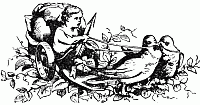
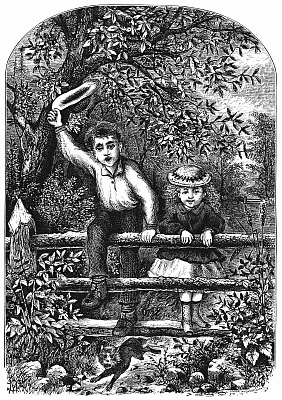 LOOK OUT FOR THE ENGINE!
LOOK OUT FOR THE ENGINE!

They soon had a large pile heaped up in the middle of the road which led through the forest. "For," said Bob, "we must make the fire where it won't do any mischief."
When all was ready, Bob lighted a match, and tucked it under the leaves. Then, getting down on his knees, he puffed and blew with his mouth, until first there rose a tiny stream of smoke; then a little flame crept out; and, in a moment more, the pile was blazing merrily.
The children got some large stones, and sat down on them to warm their hands; for Sally said her nose and fingers were so cold, she was sure Jack Frost must be somewhere around. They could not make Carlo come near the fire: he was afraid of it, it crackled and sputtered so. He liked better to lie under the bushes near the dinner-basket.
"What a splendid bonfire!" said Bob.
"Yes," said Sally; "but don't you wish we had some nice apples to roast in the coals?"
Just as she said this, they heard the whistle of a locomotive away in the distance. "Look out for the engine!" shouted Bob, jumping up. "Let's run and see the cars go by."
Away they ran down the road, to the edge of the woods, and climbed up on the fence. By leaning over, they could look far up the track, and watch the train come thundering down. First only a black speck was in sight; then the great[3] lantern in front of the locomotive glittered in the sun; and soon the train was rushing by.
Bob balanced himself on the top rail, and shouted, "Hurrah!" Sally screamed, "Good-by, good-by!" at the top of her voice; and Carlo bristled up his hair, and barked loudly, wondering all the time what this strange creature could be, which made such a racket, and ran faster than he could.
The people in the cars heard the noise, and looked out to see where it came from. They saw a boy without his jacket perched on a fence, waving his hat; a little girl by his side, laughing so hard that she showed all her teeth; and a funny little yellow dog yelping with all his might: that was all. But they thought it a pretty picture, and opened the car-windows to wave their handkerchiefs.
As the last car rushed by, a lady at one of the windows tossed out two rosy apples. Down jumped Bob and Sally to pick them up. The apples had fallen in some thick grass, and were not bruised at all. "Just what we wanted," said Sally; "but, oh, dear! I'm so tired with shouting, that I don't believe I can eat my apple." She did eat it, though, every bit of it, except the seeds.
The children who had "The Nursery" last year will remember the story called "Kindness is better than Blows," where the bookseller with an apple coaxed the horse to draw a heavy load up the hill. Little Willy Gay looked at that picture very carefully, and soon made practical use of it, as I will tell you.
Willy is very fond of playing horse, but has no brother to[4] play with him. His sister Edith, three years old, does not like to play horse: she prefers to be with her dollies. Sometimes Willy gets cross, and scolds at her because she will not play horse as much as he wants her to.
A few days ago I saw Willy coming up from the cellar with a large red apple in his hand; and soon after I heard the two children racing through the rooms, having a merry time; and Willy called out, "O mamma! I gave Edie an apple, and she did play horse."
You see, he had thought about that story, and made up his mind to try to coax little sister, as the man did the horse: he soon found that kind words and deeds were better than scolding.
I hope he will not forget it very soon.
I have a little daughter who never returns from a walk in the woods without bringing a bunch of gay flowers. I have taught her to make of them many little works of art, which you may also like to learn, dear reader.
Here is the first. Certainly there must grow in your neighborhood some larch or spruce trees. If we look sharp, we shall soon find on them a handsome half-open cone. In the small openings of this cone we stick delicate flowers and grasses which we find in the meadows and fields.
When our nosegay is ready, we lay the cone with the flowers very carefully in a dish of water.
After an hour, the cone is so closely shut, that the flowers are held as fast in its scales as if they had always grown there. This makes a very nice present.[5]
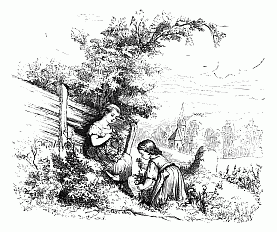
I will tell you how to make another pretty thing. You know what a burr is. Alas! it has often played you many a naughty trick,—woven itself provokingly into your clothes, or perhaps into your hair. I can teach you to make a better use of it.
Pluck an apron full: lay them one against another so that they shall stick fast together, and make in this manner the bottom of a small basket of any shape you like,—round, square, or oval.
Now build the burrs up around the edge to form the sides. When this is finished, make also the handle of burrs. A lovely little basket stands before you, which you can fill with flowers or berries from the fields, and carry home to your mother. Of course you know how to make wreaths and bouquets; but to make them tastefully is a true work of art, in which all children should try to become skilful.
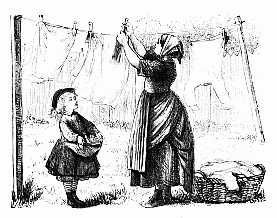
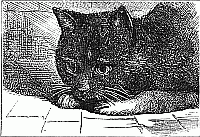
Kit Midge was thought in the family to be a wonderful little cat. She enjoyed sitting in the sunshine; she liked to feast upon the dainty little mice; and, oh, dear me! now and then, she liked to catch a bird!
This was very naughty, of course; but the best trained cats have their faults. One morning Kit ate her breakfast with great relish, washed her face and paws, smoothed down her fur coat, and went into the parlor to take a nap in the big arm-chair.
The sun shone full in her face; and she blinked and purred and felt very good-natured; for, only the night before, she had caught her first rat, and for such a valiant deed had been praised and petted to her heart's content.
Well, Kit Midge fell asleep in the chair, with one little pink ear turned back, that she might wake easily, and a black tail curled round her paws. By and by one eye opened; and, peeping out, she saw her mistress walking across the room with a dear little yellow-bird in her hand, which she placed on a plant that stood on the top shelf of the plant-stand.
Now, Midge had looked with longing eyes for weeks upon a lovely canary, which sang on its perch far out of her reach; and I suppose she thought this was the same bird among the green leaves.
But she was a wise little cat: so she slept on, with both eyes open, until her mistress had left the room. Then Kitty[9] came down from the chair, and, creeping softly to the stand, made a spring, and seized birdie between her teeth. Then, jumping down, she dropped the bird on the carpet, smelled it, looked ashamed, and sneaked away.
It was only a stuffed bird; and when her mistress, who had been peeping in at the door all the time, said, laughing, "O Kit Midge, I am perfectly ashamed of you!" Kitty just ran out of the room, and did not show herself the rest of the day.
Kit Midge was never known to catch a bird after that.
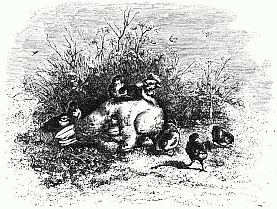
What can be prettier than a brood of chickens with a good motherly hen, like the one in this picture! See how the little chicks nestle and play about their mother! and see what a watchful eye she has over them! But some chickens do not have such kind mothers, as you shall hear.[10]
There was a little black one in our yard this spring, which none of the mother-hens would own. They would peck at it, and drive it away, till it was almost starved. Aunt Jennie told our little Hettie that she might have it for her own, if she would take care of it.
So Hettie put the chicken in a cage, with some wool to cover it, and fed it several times every day, till it came to know her. When it was let out of the cage, it would follow her about wherever she went.
One night Hettie went to bed, and forgot to put her pet in its cage. What do you think it did? It just flew up on her pillow; and there it sat with its head tucked under its wing.
Hettie named it Posey, and called it her daughter.
"What will you be, some day, when Posey lays eggs, and brings out a brood of little chickens?" asked mamma one day.
That was a new idea to Hettie; and it puzzled her little brain for a minute: then she laughed out, "Shall I be their grandmother?"
Papa looked up from his paper to see what amused his little girl so much; and, when she had told him, he said he would have a pair of spectacles ready for her; and mamma said she would make her a cap; and Hettie said her little arm-chair would be very nice for a grandmother's chair.
"What will you do as you sit in your chair?" said mamma.
"Let me think," replied Hettie. "Why, my grandma is always knitting mittens and socks and hoods for us; and I must learn to knit, so I can knit some for my grandchildren."
Mamma said she would teach her, and they would begin that very day.
And now, wouldn't you like to see our little Hettie with her roguish eyes peeping over spectacles, and her sunny curls straying from her cap, and her chubby little hands knitting mittens, and all in that little arm-chair?
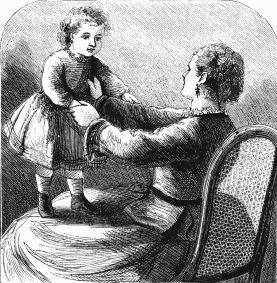
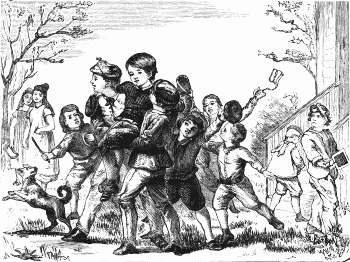
John Tubbs was one day doing his sums, when little Sam Jones pushed against him; and down went the slate with a horrid clatter. "Take care of the pieces!" said the boys, laughing. But Mr. Brill, the master, thought it no laughing matter, and, believing it to be John Tubbs's fault, told him that he should pay for the slate, and have his play stopped for a week.
John said nothing. He did not wish to get little Sam into trouble: so he bore the blame quietly. John's mother was by no means pleased at having to pay for the slate, as she was a poor woman, and had to provide for several other little Tubbses besides John.
"I tell you what it is, John," said she, "you must learn to be more careful. I shall not give you any milk for your[13] breakfast all the week; and by this I shall save money for the slate, which it is right you should pay for."
Poor John ate his bread with water instead of milk: but somehow he was not unhappy, for he felt that he had done a kindness to little Sam Jones; and the satisfaction of having rendered a service to another always brings happiness.
A few days after, Mr. Jones came to the school, and spoke to Mr. Brill about the matter; for little Sam had told his father and mother all about it. Sam was a timid boy; but he could not bear to see John Tubbs kept in for no fault, while the other boys were at play.
"What!" said the master, "and has John Tubbs borne all the blame without saying a word?—Come here, John."
"What's the matter now?" said John to himself. "Something else, I suppose. Well, never mind, so that poor little Sam Jones has got out of his little scrape."
"Now, boys," said Mr. Brill, "here's John Tubbs. Look at him!" And the boys did look at him as a criminal; and John looked very much like a criminal, and began to think that he must be a bad sort of fellow to be called up in this way by his master.
Then Mr. Brill, the master, told the boys all about the broken slate,—that John did not break it, but bore all the blame to save Sam Jones from trouble, and had gone without his milk and play without a murmur. The good schoolmaster said that such conduct was above all praise; and, when he had done speaking, the boys burst out into a cheer. Such a loud hurrah! it made the school-walls ring again. Then they took John on their shoulders, and carried him in triumph round the playground.
And what did John say to all this? He only said, "There, that'll do. If you don't mind, you'll throw a fellow down."
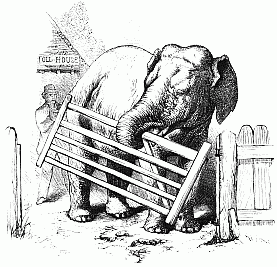
On the first day of May, Barnum's menagerie came to our town; and Clarence went with his papa to see the animals. He enjoyed looking at them all; but most of all he liked the monkeys and the elephants.
He fed the monkeys with candy, and laughed to see them hang by their tails while they took it from his hand. They ate all the candy he would give them, and did it in a very funny way.
Clarence's papa said the candy had better be eaten by monkeys than by boys; but I doubt whether Clarence was of that opinion.[15]
Clarence was afraid of the great elephant when his papa first took him near it, and hung back when they came within reach of its trunk.
"Why are you afraid of the elephant, Clarence?" asked his papa. "I'm afraid he will trunk me," said Clarence.
But he soon got over his fear, and was so busy feeding the elephant, that his papa had to coax him away.
On their way home, Clarence's papa told the little boy some stories about elephants. Here is one of them:—
A famous elephant, called Jack, was once travelling with his keeper from Margate to Canterbury in England, when they came to a toll-bar. Jack's keeper offered the right toll, but the toll-bar man would not take it. He wanted to make them pay more than was right. So he kept the gate shut. On this the keeper went through the little foot-gate to the other side of the bar, calling out, "Come on, Jack!" and at once the elephant applied his trunk to the rails of the gate, lifted it from its hinges, and dashed it to the ground. He then went on his way, while the toll-bar man stood petrified to see what a mistake he had made in demanding an unjust toll from an elephant.
"Now, Clarence," said his papa, "I suppose you would say that the elephant 'trunked' the toll-gate, and so he did; but, you see, it was because he did not choose to be imposed upon."
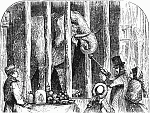
That is what the old hen must have said to our little pup Bravo, who, being three months old, thought he was a match for any chicken or hen in the whole barnyard. He made up his mind that he would first try his courage on a little yellow chick named Downy, who was just three days old, and who had strayed away from his mother's wing to pick up a crumb.
So with a fearful growl, and a bark that might have frightened a lion, Bravo made a leap and a spring after poor little Downy. But Downy was too intent on his crumb of bread to take much notice of the enemy; and then Bravo, like a prudent general, stopped short, and tried his artillery before approaching any nearer. In other words, he began to bark in such a terrible manner, that any reasonable person would have shown his respect by running away.
But Downy was too young to reason, or show respect. Bravo, though as valiant as Julius Cæsar, was, at the same time, as cautious and careful as Fabius; and, if you do not know who Fabius was, I must tell you. He was a Roman general who was very famous for his ability in retreating, and getting out of an enemy's way.
Bravo thought to himself, "It holds to reason, since that little chick isn't afraid of such a powerful dog as I am, that there must be help near at hand." And, sure enough, hardly had Bravo thought this, when from behind some rushes ran out an old hen, followed by four, five, six chickens; and the old hen, with her feathers all ruffled, went right at Bravo, while the chicks stood behind sharpening their bills, and getting ready to join in the battle with their mother.
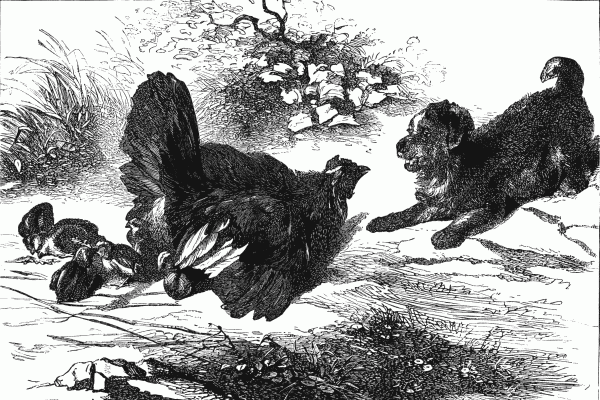
[17]Although the most courageous of dogs, it could not be expected that Bravo would be so foolhardy as to make a [18] stand against such odds. He paused a moment, with his mouth open, as the terrible old hen came at him; and then, seeing that the tide of battle was against him, he ran off as fast as he could to his master's door-step. But, though defeated, he showed his spirit by keeping up a frightful barking. The old hen and her chicks, however, were so stupid that they did not mind it much.
Indeed, the old hen, with her family, came up so near to the door-step, that Bravo was obliged to make a second retreat. This he did with such success and good general-ship, that he escaped unhurt. Thus ended Bravo's first battle; and I think you will agree with me, that many a general with epaulets would not have done any better.
First Sparrow (the one standing with both wings spread).—Oh, look here! Come all. See what has happened! Here is old Scratch-claw with his tail caught fast in the door.
Second Sparrow.—Where is he? Let me see. Oh, isn't this jolly! Halloo, Sparrows! Come and see. Come one, come all.
Third Sparrow.—That's the rascal that killed and ate three of my little ones.
Fourth Sparrow.—He came near catching me, the other day. Didn't he spit viciously when he saw me get out of his way?
Fifth Sparrow (the one on the ground).—How are you, old Sneezer? How are your folks? Don't you find yourself comfortable?[19]
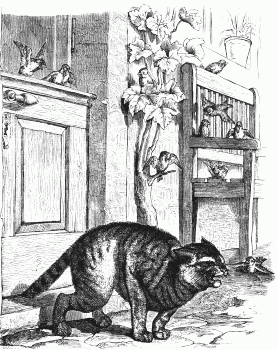
Pussy.—Siss-ss-siss-ss! Mee-ow? mee-ow!
Fifth Sparrow.—Oh! wouldn't you like to, though? Spit away, old fellow! It's music to us sparrows.
Sixth Sparrow.—You are the brute that killed my dear little Spotted-wing.[20]
Seventh Sparrow.—He also murdered my precious little Twitterwit.
Eighth Sparrow.—He is a bad fellow; and it is not surprising he has come to grief.
Ninth Sparrow.—Pull away, old boy! Sha'n't we come and help you? I love you so, I would like a lock of your hair.
Tenth Sparrow (the one on the lowest bough).—Children, hush! It is not good sparrow morality to jeer at an enemy in affliction,—even a cat.
Fifth Sparrow.—O grandfather, you shut up your bill! Just you go within reach of his claws, and see what cat-gratitude is.
Tenth Sparrow.—My children, we must not exult over the pains even of an enemy. A cat has feelings.
Pussy.—Siss-hiss-hoo! Mee-ow! Fitt! Fitt!
Fifth Sparrow.—What a lovely voice!
Sixth Sparrow.—The expression of his face, too, how charming!
Tenth Sparrow.—Fly back, all of you, to your bushes and trees; for here comes a little boy who will see that Pussy is rescued.
First Sparrow.—Well, I wouldn't have missed this spectacle for a good deal.
Fifth Sparrow.—It is better than Barnum's exhibition any day.
First Sparrow.—Yes, and it costs us nothing.
Tenth Sparrow.—There! Fly away, all of you! Fly away! You have said enough. I am ashamed of you all. You ought to know better than to be revengful. You are quite as bad as boys and men.
Fifth Sparrow.—Grandfather is getting to be abusive. Let us fly off. Good-by, Pussy! Pull away!
Four little birds came out to greet The first pond-lily, so fair and sweet, The first that opened its petals white To the wooing breeze and the golden light. They flew around, then sat on the tree, And sang, "You are sweet as sweet can be: O dear Pond-lily! we do not jest: Now, which of us all do you love best?" Pond-lily spoke not, but, instead, Dipped in the water her beautiful head, As much as to say, "I'm well content In this my own pure element." The birds they sang in their very best style, But got no answer, not even a smile; For Pond-lily knew it was safest and best To keep where she was, on the wave's cool breast, And never to listen to flattering words From idle suitors and wandering birds. Emily Carter. |
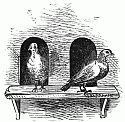
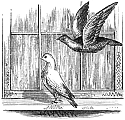
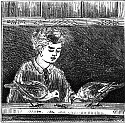
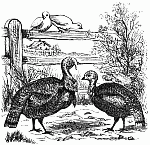
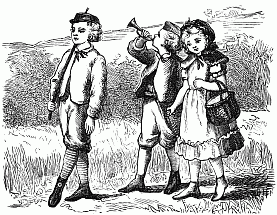
Young as Alan was, he had heard from his uncle Paul many a story about people seeking their fortune: so, one fine summer day, he set off with his brother Owen and his sister Amy a-fortune-seeking. Alan carried a stick; and Amy had a little basket on her arm.
Alan led the way, telling Owen and Amy to keep close to him, and to fear nothing. As they passed by Lakin's pond, a duck gave a loud quack; when they came to the great ash-tree, a bee buzzed by them: but neither the quacking nor the buzzing frightened the bold Alan; and on he went, holding up his stick.
They had almost reached the sawyer's cottage, when a black animal ran out towards them. Alan asked if he should attack the tiger? Owen would have it that it was only a puppy dog: but Alan said that did not matter; for it had four legs and a head and a tail, and so had a tiger. Owen thought[25] he had better let it alone; and Amy tamed the tiger at once by giving it a bit of bread from her basket.
Suddenly they came to a spot where five or six geese and a few goslings were waddling about. The gander came towards them, stretching out his neck, and hissing loudly. Owen and Amy ran back, followed by Alan, who told them, that, if he had hit the gander with his stick, he would have frightened the goslings.
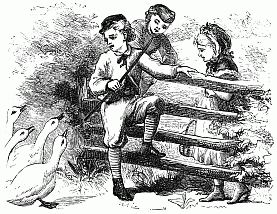
As there was a stile near, leading into a field, they all got over the stile, and thus passed the geese.
"I wonder how that gander would like it," said Alan, "if I were to turn back, and lay hold of him by his long neck, and shake him?" Amy begged of him by no means to think of such a thing; and so Alan told her that he would not. Little did the gander know of his narrow escape!
Ah, me! what perils await those who go on their travels to seek their fortunes! A little brook was now before them; and Alan said, "This river must be crossed, and I hope that[26] none of us will be carried away by the current. What we shall do if an Indian springs from behind the bushes, or a crocodile comes out of the sedge, I don't know. Here is the narrowest part of the river. I will lay my stick across it; and, if we make believe very much, it will do for a bridge."
"But I can't walk along your stick," said Amy. "Never mind that," said Alan: "a bridge is a bridge, whether we walk along it or not." So Alan laid his stick across the narrow part, and then jumped over the brook, followed by Owen and Amy. No Indian sprang from the bush, no crocodile came out of the sedge; and the river was crossed without one of them being drowned.
All at once it came into Alan's head that Uncle Paul had once been attacked by a wolf, and that they ought to have an adventure of the same kind: he therefore asked Owen if he would consent to be eaten up by a wolf. Owen said he did not like it: he thought Alan ought to be eaten, for he was the biggest. Alan said that would never do; for then there would be nobody to care for him and Amy.
But, besides this difficulty, there was another: they had no wolf; and, where to get one, they did not know. At last it was settled. Owen was to be the wolf, and to spring on Amy; but before he had eaten her up, or even so much as snapped off her little finger, Alan was to rush upon him with his stick, and drive him back into the woods.
Amy was now left alone, that Owen might get behind one bush, and Alan behind another. No sooner was this done, than, with her basket on her arm, she went on her journey.
And now Amy was almost come to the bush behind which Owen was crouching. For a moment she made a stop, as though she hardly durst go by; but at last she went on. Suddenly the wolf leaped out, and caught hold of her.[27]
What was poor Amy to do? Well was it for her that Alan happened to come up. Many people are frightened at wolves; but Alan did not seem frightened at all.
It was a hard struggle; for the wolf pulled poor Amy one way, and Alan pulled her the other; but at length Alan won the day. "Shall I kill the wolf, Amy?" cried he, lifting up his stick. "No, no!" cried Amy: "he has not hurt me a bit. He is not a real wolf, but only my brother Owen."
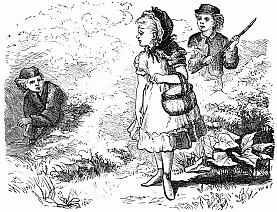
The affair of the wolf having passed off so well, Alan began to bethink himself of other adventures. So much had he heard from Uncle Paul about Indians, that his heart was set on going among them.
Both Owen and Amy wondered where he would find the Indians; but Alan said, "That thicket yonder is quite as likely a place to find them in as any that I know."
"We have not seen one yet," said Owen. "No," replied Alan: "Indians always get behind the trees." This made Owen and Amy look about them, as if they feared every tree had an Indian behind it.[28]
Alan set off for the thicket, while Owen and Amy sat down to talk over their travels; but it was not long before Alan again joined them. Whether the Indians were absent on some expedition, or whatever else might be the cause, certain it was that Alan had found no Indians. He had, however, torn the leg of one of his stockings: so he asked Amy to bind up his wounds.
"But you have not hurt your leg," said Amy: "you have only torn a hole in your stocking."
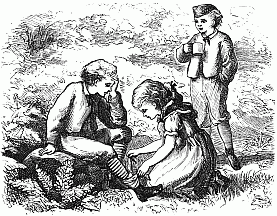
"Never mind that!" replied Alan. "We are out on our travels, seeking our fortunes, and must make the most of every thing. Bind up my wounded leg."
Little Amy tied up his leg with his handkerchief; and, considering that she had never bound up a wound before, it did her great credit.
It is due to Alan to say that the misfortune of his wounded leg by no means cooled his courage. "What is the use," said he, "of complaining? Those who go to seek their fortunes must learn to bear pain."[29]
One of Alan's plans was to find a treasure; and, as they had neither spade nor pickaxe with them to dig for gold, he thought the best way would be for them to find a bag of money. Amy said, if they found a bag of money, she should like to take Dolly some. This being generously agreed to by Alan and Owen, they proceeded with their plan.
Alan took Amy's handkerchief, and tied up some grass in it. He then told Owen to go on a little way and drop it; and this Owen did. "Hi!" cried Alan, when he came up to the spot: "what have we here? Who would have thought that a merchant would have dropped a bag of money in such a place as this?"
All at once Owen and Amy bethought themselves that they had no right to the gold, as it belonged to the merchant who had lost it; but Alan met this objection by saying that they could easily inquire for the merchant as they went along, and give up the money if they found him. Thus pacified, Owen and Amy allowed Alan to lift the heavy bag of money into the basket: this he seemed to do with great difficulty.
But how was the basket to be carried with so heavy a weight in it? Said Alan, "Where there is a will, there is a way." A stick was procured, and passed through the handle of the basket, one end of it resting on Owen's shoulder, and the other end on the shoulder of Amy.
Alan with his leg tied up, leaning on his stick for support, hobbled onward; and Owen and Amy appeared to toil with might and main, bending under their load.
They had almost come to the turn by the birch-trees, when suddenly Dash, their own favorite dog, came barking joyfully towards them. At that very moment their parents were waiting for them with the pony-chaise at the end of the lane.[30]
No sooner did our little fortune-seekers set eyes on the pony-chaise than off they set in a scamper, strangely forgetful of what had passed. It was wonderful to see how nimble Alan was in spite of his wounded leg; and with what ease Owen and Amy ran along with that heavy load of gold, which before had well-nigh weighed them down to the ground.
The little stepmother, with her blue eyes and rosy cheeks, sat in the yard, surrounded by her pets, and busily paring some apples.
From heaven blew the morning wind, and greeted the lovely child: "Little stepmother, I will by thee remain: I will make the time pass merrily for thee, and cool thy red cheeks. Dost thou not hear?"
A sparrow sat before her on the bench, and twittered: "This is my place; my stomach is empty. Little stepmother, I am very hungry. I beg thee to give me some breakfast. Dost thou not hear?"
The dove swelled with anger, and said, "Go away, thou vagabond, thou beggar sparrow, thou glutton!—Little stepmother, I politely ask thee only for a sip of water. Dost thou not hear?"
The cat sat lost in thought, opening and shutting her eyes. "Little stepmother," said the cat, "my stomach, too, is empty. Go thou for some meat, or else look out that no harm comes to thy dear birds in the yard. Dost thou not hear?"
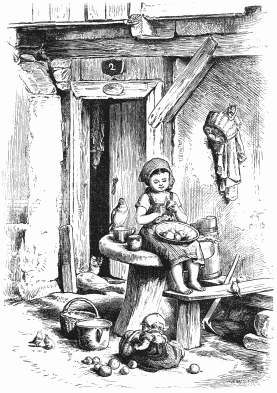
The little stepmother laughed, and said, "Be not so impatient! I must first make a dish of apple-sauce for the seven and seventy guests who are coming to my wedding-feast.[31] When they are all assembled, then shall the morning wind play for the dance. You, beloved birds, shall be my bridesmaids, and the cat shall be the bride's father."
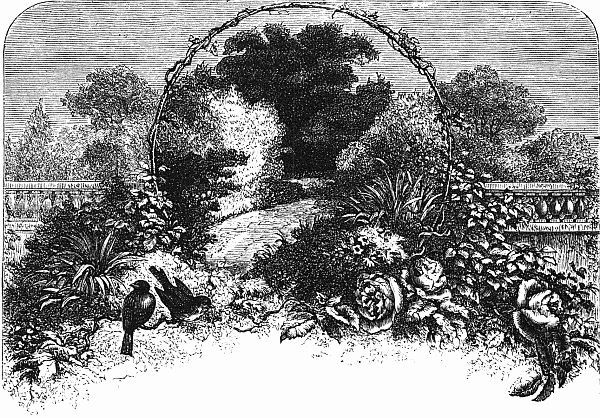

| 2. This is the way the sun comes up: Gold on brooks and glossy leaves, Mist that melts above the sheaves, Vine and rose and buttercup,— This is the way the sun comes up. | 3. This is the way the birdie sings: "Baby birdies in the nest, You I surely love the best; Over you I fold my wings,"— This is the way the birdie sings. |
This issue was part of an omnibus. The original table of contents covered the entire second half of 1873. The remaining text of the table of contents can be found in the rest of the year's issues.
Obvious punctuation errors repaired.
End of Project Gutenberg's The Nursery, July 1873, Vol. XIV. No. 1, by Various
*** END OF THIS PROJECT GUTENBERG EBOOK NURSERY, JULY 1873, VOL.XIV NO.1 ***
***** This file should be named 24938-h.htm or 24938-h.zip *****
This and all associated files of various formats will be found in:
https://www.gutenberg.org/2/4/9/3/24938/
Produced by Emmy, Juliet Sutherland and the Online
Distributed Proofreading Team at https://www.pgdp.net Music
by Linda Cantoni.
Updated editions will replace the previous one--the old editions
will be renamed.
Creating the works from public domain print editions means that no
one owns a United States copyright in these works, so the Foundation
(and you!) can copy and distribute it in the United States without
permission and without paying copyright royalties. Special rules,
set forth in the General Terms of Use part of this license, apply to
copying and distributing Project Gutenberg-tm electronic works to
protect the PROJECT GUTENBERG-tm concept and trademark. Project
Gutenberg is a registered trademark, and may not be used if you
charge for the eBooks, unless you receive specific permission. If you
do not charge anything for copies of this eBook, complying with the
rules is very easy. You may use this eBook for nearly any purpose
such as creation of derivative works, reports, performances and
research. They may be modified and printed and given away--you may do
practically ANYTHING with public domain eBooks. Redistribution is
subject to the trademark license, especially commercial
redistribution.
*** START: FULL LICENSE ***
THE FULL PROJECT GUTENBERG LICENSE
PLEASE READ THIS BEFORE YOU DISTRIBUTE OR USE THIS WORK
To protect the Project Gutenberg-tm mission of promoting the free
distribution of electronic works, by using or distributing this work
(or any other work associated in any way with the phrase "Project
Gutenberg"), you agree to comply with all the terms of the Full Project
Gutenberg-tm License (available with this file or online at
https://gutenberg.org/license).
Section 1. General Terms of Use and Redistributing Project Gutenberg-tm
electronic works
1.A. By reading or using any part of this Project Gutenberg-tm
electronic work, you indicate that you have read, understand, agree to
and accept all the terms of this license and intellectual property
(trademark/copyright) agreement. If you do not agree to abide by all
the terms of this agreement, you must cease using and return or destroy
all copies of Project Gutenberg-tm electronic works in your possession.
If you paid a fee for obtaining a copy of or access to a Project
Gutenberg-tm electronic work and you do not agree to be bound by the
terms of this agreement, you may obtain a refund from the person or
entity to whom you paid the fee as set forth in paragraph 1.E.8.
1.B. "Project Gutenberg" is a registered trademark. It may only be
used on or associated in any way with an electronic work by people who
agree to be bound by the terms of this agreement. There are a few
things that you can do with most Project Gutenberg-tm electronic works
even without complying with the full terms of this agreement. See
paragraph 1.C below. There are a lot of things you can do with Project
Gutenberg-tm electronic works if you follow the terms of this agreement
and help preserve free future access to Project Gutenberg-tm electronic
works. See paragraph 1.E below.
1.C. The Project Gutenberg Literary Archive Foundation ("the Foundation"
or PGLAF), owns a compilation copyright in the collection of Project
Gutenberg-tm electronic works. Nearly all the individual works in the
collection are in the public domain in the United States. If an
individual work is in the public domain in the United States and you are
located in the United States, we do not claim a right to prevent you from
copying, distributing, performing, displaying or creating derivative
works based on the work as long as all references to Project Gutenberg
are removed. Of course, we hope that you will support the Project
Gutenberg-tm mission of promoting free access to electronic works by
freely sharing Project Gutenberg-tm works in compliance with the terms of
this agreement for keeping the Project Gutenberg-tm name associated with
the work. You can easily comply with the terms of this agreement by
keeping this work in the same format with its attached full Project
Gutenberg-tm License when you share it without charge with others.
1.D. The copyright laws of the place where you are located also govern
what you can do with this work. Copyright laws in most countries are in
a constant state of change. If you are outside the United States, check
the laws of your country in addition to the terms of this agreement
before downloading, copying, displaying, performing, distributing or
creating derivative works based on this work or any other Project
Gutenberg-tm work. The Foundation makes no representations concerning
the copyright status of any work in any country outside the United
States.
1.E. Unless you have removed all references to Project Gutenberg:
1.E.1. The following sentence, with active links to, or other immediate
access to, the full Project Gutenberg-tm License must appear prominently
whenever any copy of a Project Gutenberg-tm work (any work on which the
phrase "Project Gutenberg" appears, or with which the phrase "Project
Gutenberg" is associated) is accessed, displayed, performed, viewed,
copied or distributed:
This eBook is for the use of anyone anywhere at no cost and with
almost no restrictions whatsoever. You may copy it, give it away or
re-use it under the terms of the Project Gutenberg License included
with this eBook or online at www.gutenberg.org
1.E.2. If an individual Project Gutenberg-tm electronic work is derived
from the public domain (does not contain a notice indicating that it is
posted with permission of the copyright holder), the work can be copied
and distributed to anyone in the United States without paying any fees
or charges. If you are redistributing or providing access to a work
with the phrase "Project Gutenberg" associated with or appearing on the
work, you must comply either with the requirements of paragraphs 1.E.1
through 1.E.7 or obtain permission for the use of the work and the
Project Gutenberg-tm trademark as set forth in paragraphs 1.E.8 or
1.E.9.
1.E.3. If an individual Project Gutenberg-tm electronic work is posted
with the permission of the copyright holder, your use and distribution
must comply with both paragraphs 1.E.1 through 1.E.7 and any additional
terms imposed by the copyright holder. Additional terms will be linked
to the Project Gutenberg-tm License for all works posted with the
permission of the copyright holder found at the beginning of this work.
1.E.4. Do not unlink or detach or remove the full Project Gutenberg-tm
License terms from this work, or any files containing a part of this
work or any other work associated with Project Gutenberg-tm.
1.E.5. Do not copy, display, perform, distribute or redistribute this
electronic work, or any part of this electronic work, without
prominently displaying the sentence set forth in paragraph 1.E.1 with
active links or immediate access to the full terms of the Project
Gutenberg-tm License.
1.E.6. You may convert to and distribute this work in any binary,
compressed, marked up, nonproprietary or proprietary form, including any
word processing or hypertext form. However, if you provide access to or
distribute copies of a Project Gutenberg-tm work in a format other than
"Plain Vanilla ASCII" or other format used in the official version
posted on the official Project Gutenberg-tm web site (www.gutenberg.org),
you must, at no additional cost, fee or expense to the user, provide a
copy, a means of exporting a copy, or a means of obtaining a copy upon
request, of the work in its original "Plain Vanilla ASCII" or other
form. Any alternate format must include the full Project Gutenberg-tm
License as specified in paragraph 1.E.1.
1.E.7. Do not charge a fee for access to, viewing, displaying,
performing, copying or distributing any Project Gutenberg-tm works
unless you comply with paragraph 1.E.8 or 1.E.9.
1.E.8. You may charge a reasonable fee for copies of or providing
access to or distributing Project Gutenberg-tm electronic works provided
that
- You pay a royalty fee of 20% of the gross profits you derive from
the use of Project Gutenberg-tm works calculated using the method
you already use to calculate your applicable taxes. The fee is
owed to the owner of the Project Gutenberg-tm trademark, but he
has agreed to donate royalties under this paragraph to the
Project Gutenberg Literary Archive Foundation. Royalty payments
must be paid within 60 days following each date on which you
prepare (or are legally required to prepare) your periodic tax
returns. Royalty payments should be clearly marked as such and
sent to the Project Gutenberg Literary Archive Foundation at the
address specified in Section 4, "Information about donations to
the Project Gutenberg Literary Archive Foundation."
- You provide a full refund of any money paid by a user who notifies
you in writing (or by e-mail) within 30 days of receipt that s/he
does not agree to the terms of the full Project Gutenberg-tm
License. You must require such a user to return or
destroy all copies of the works possessed in a physical medium
and discontinue all use of and all access to other copies of
Project Gutenberg-tm works.
- You provide, in accordance with paragraph 1.F.3, a full refund of any
money paid for a work or a replacement copy, if a defect in the
electronic work is discovered and reported to you within 90 days
of receipt of the work.
- You comply with all other terms of this agreement for free
distribution of Project Gutenberg-tm works.
1.E.9. If you wish to charge a fee or distribute a Project Gutenberg-tm
electronic work or group of works on different terms than are set
forth in this agreement, you must obtain permission in writing from
both the Project Gutenberg Literary Archive Foundation and Michael
Hart, the owner of the Project Gutenberg-tm trademark. Contact the
Foundation as set forth in Section 3 below.
1.F.
1.F.1. Project Gutenberg volunteers and employees expend considerable
effort to identify, do copyright research on, transcribe and proofread
public domain works in creating the Project Gutenberg-tm
collection. Despite these efforts, Project Gutenberg-tm electronic
works, and the medium on which they may be stored, may contain
"Defects," such as, but not limited to, incomplete, inaccurate or
corrupt data, transcription errors, a copyright or other intellectual
property infringement, a defective or damaged disk or other medium, a
computer virus, or computer codes that damage or cannot be read by
your equipment.
1.F.2. LIMITED WARRANTY, DISCLAIMER OF DAMAGES - Except for the "Right
of Replacement or Refund" described in paragraph 1.F.3, the Project
Gutenberg Literary Archive Foundation, the owner of the Project
Gutenberg-tm trademark, and any other party distributing a Project
Gutenberg-tm electronic work under this agreement, disclaim all
liability to you for damages, costs and expenses, including legal
fees. YOU AGREE THAT YOU HAVE NO REMEDIES FOR NEGLIGENCE, STRICT
LIABILITY, BREACH OF WARRANTY OR BREACH OF CONTRACT EXCEPT THOSE
PROVIDED IN PARAGRAPH F3. YOU AGREE THAT THE FOUNDATION, THE
TRADEMARK OWNER, AND ANY DISTRIBUTOR UNDER THIS AGREEMENT WILL NOT BE
LIABLE TO YOU FOR ACTUAL, DIRECT, INDIRECT, CONSEQUENTIAL, PUNITIVE OR
INCIDENTAL DAMAGES EVEN IF YOU GIVE NOTICE OF THE POSSIBILITY OF SUCH
DAMAGE.
1.F.3. LIMITED RIGHT OF REPLACEMENT OR REFUND - If you discover a
defect in this electronic work within 90 days of receiving it, you can
receive a refund of the money (if any) you paid for it by sending a
written explanation to the person you received the work from. If you
received the work on a physical medium, you must return the medium with
your written explanation. The person or entity that provided you with
the defective work may elect to provide a replacement copy in lieu of a
refund. If you received the work electronically, the person or entity
providing it to you may choose to give you a second opportunity to
receive the work electronically in lieu of a refund. If the second copy
is also defective, you may demand a refund in writing without further
opportunities to fix the problem.
1.F.4. Except for the limited right of replacement or refund set forth
in paragraph 1.F.3, this work is provided to you 'AS-IS' WITH NO OTHER
WARRANTIES OF ANY KIND, EXPRESS OR IMPLIED, INCLUDING BUT NOT LIMITED TO
WARRANTIES OF MERCHANTIBILITY OR FITNESS FOR ANY PURPOSE.
1.F.5. Some states do not allow disclaimers of certain implied
warranties or the exclusion or limitation of certain types of damages.
If any disclaimer or limitation set forth in this agreement violates the
law of the state applicable to this agreement, the agreement shall be
interpreted to make the maximum disclaimer or limitation permitted by
the applicable state law. The invalidity or unenforceability of any
provision of this agreement shall not void the remaining provisions.
1.F.6. INDEMNITY - You agree to indemnify and hold the Foundation, the
trademark owner, any agent or employee of the Foundation, anyone
providing copies of Project Gutenberg-tm electronic works in accordance
with this agreement, and any volunteers associated with the production,
promotion and distribution of Project Gutenberg-tm electronic works,
harmless from all liability, costs and expenses, including legal fees,
that arise directly or indirectly from any of the following which you do
or cause to occur: (a) distribution of this or any Project Gutenberg-tm
work, (b) alteration, modification, or additions or deletions to any
Project Gutenberg-tm work, and (c) any Defect you cause.
Section 2. Information about the Mission of Project Gutenberg-tm
Project Gutenberg-tm is synonymous with the free distribution of
electronic works in formats readable by the widest variety of computers
including obsolete, old, middle-aged and new computers. It exists
because of the efforts of hundreds of volunteers and donations from
people in all walks of life.
Volunteers and financial support to provide volunteers with the
assistance they need, is critical to reaching Project Gutenberg-tm's
goals and ensuring that the Project Gutenberg-tm collection will
remain freely available for generations to come. In 2001, the Project
Gutenberg Literary Archive Foundation was created to provide a secure
and permanent future for Project Gutenberg-tm and future generations.
To learn more about the Project Gutenberg Literary Archive Foundation
and how your efforts and donations can help, see Sections 3 and 4
and the Foundation web page at https://www.pglaf.org.
Section 3. Information about the Project Gutenberg Literary Archive
Foundation
The Project Gutenberg Literary Archive Foundation is a non profit
501(c)(3) educational corporation organized under the laws of the
state of Mississippi and granted tax exempt status by the Internal
Revenue Service. The Foundation's EIN or federal tax identification
number is 64-6221541. Its 501(c)(3) letter is posted at
https://pglaf.org/fundraising. Contributions to the Project Gutenberg
Literary Archive Foundation are tax deductible to the full extent
permitted by U.S. federal laws and your state's laws.
The Foundation's principal office is located at 4557 Melan Dr. S.
Fairbanks, AK, 99712., but its volunteers and employees are scattered
throughout numerous locations. Its business office is located at
809 North 1500 West, Salt Lake City, UT 84116, (801) 596-1887, email
[email protected]. Email contact links and up to date contact
information can be found at the Foundation's web site and official
page at https://pglaf.org
For additional contact information:
Dr. Gregory B. Newby
Chief Executive and Director
[email protected]
Section 4. Information about Donations to the Project Gutenberg
Literary Archive Foundation
Project Gutenberg-tm depends upon and cannot survive without wide
spread public support and donations to carry out its mission of
increasing the number of public domain and licensed works that can be
freely distributed in machine readable form accessible by the widest
array of equipment including outdated equipment. Many small donations
($1 to $5,000) are particularly important to maintaining tax exempt
status with the IRS.
The Foundation is committed to complying with the laws regulating
charities and charitable donations in all 50 states of the United
States. Compliance requirements are not uniform and it takes a
considerable effort, much paperwork and many fees to meet and keep up
with these requirements. We do not solicit donations in locations
where we have not received written confirmation of compliance. To
SEND DONATIONS or determine the status of compliance for any
particular state visit https://pglaf.org
While we cannot and do not solicit contributions from states where we
have not met the solicitation requirements, we know of no prohibition
against accepting unsolicited donations from donors in such states who
approach us with offers to donate.
International donations are gratefully accepted, but we cannot make
any statements concerning tax treatment of donations received from
outside the United States. U.S. laws alone swamp our small staff.
Please check the Project Gutenberg Web pages for current donation
methods and addresses. Donations are accepted in a number of other
ways including including checks, online payments and credit card
donations. To donate, please visit: https://pglaf.org/donate
Section 5. General Information About Project Gutenberg-tm electronic
works.
Professor Michael S. Hart was the originator of the Project Gutenberg-tm
concept of a library of electronic works that could be freely shared
with anyone. For thirty years, he produced and distributed Project
Gutenberg-tm eBooks with only a loose network of volunteer support.
Project Gutenberg-tm eBooks are often created from several printed
editions, all of which are confirmed as Public Domain in the U.S.
unless a copyright notice is included. Thus, we do not necessarily
keep eBooks in compliance with any particular paper edition.
Most people start at our Web site which has the main PG search facility:
https://www.gutenberg.org
This Web site includes information about Project Gutenberg-tm,
including how to make donations to the Project Gutenberg Literary
Archive Foundation, how to help produce our new eBooks, and how to
subscribe to our email newsletter to hear about new eBooks.